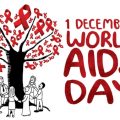By Denise Clay
ABOVE PHOTO: Deena Weems, Chad Lassiter, Rashidah Abdul-Khabeer and Wesley Anderson Jr. and Rashidah Abdul-Khabeer.
(Photos by Robert Mendelsohn)
When she and Wesley Anderson Jr. got together to form BEBASHI (Blacks Educating Blacks About Sexual Health Issues) 25 years ago, Rashidah Hassan (now Abdul-Khabeer), thought that organization she’d formed would be able to expand its reach.
“I sort of hoped that it would have morphed into something that wasn’t specifically focused on HIV/AIDS,” she said. “I hoped that we would have been able to focus on other issues.”
But by the time that BEBASHI had turned 10 years old, Abdul-Khabeer realized that her dream of an organization that would be able to put much of its focus on other issues concerning the African American community and its health needs, she said.
“HIV settled into the poorest areas with the fewest resources,” said Abdul-Khabeer, who is now the deputy director of the Family Planning Council’s Circle of Care. “We were afraid it would expand into those communities and that’s exactly what happened. There is no easy solution to deal with this, but I’m glad that BEBASHI has remained in the forefront of this discussion.”
 PHOTO: Chris Jordan and Gary Bell Executive Director of BEBASHI.
PHOTO: Chris Jordan and Gary Bell Executive Director of BEBASHI.
And for 25 years, that’s where BEBASHI has been both locally and nationally when HIV/AIDS in the African American community is discussed. On Wednesday night, the day designated nationally as World AIDS Day, the organization celebrated its anniversary with a gala at the Hilton Philadelphia Hotel co-hosted by NBC-10’s Monique Braxton and Radio ONE’s Steven Collins.
In addition to celebrating the organization’s continued existence, BEBASHI honored Abdul-Khabeer and Anderson with the organization’s Founders Award, Antonio Adolphus, a longtime employee with the organization, with an award of recognition, and John Allen Blue Awards were given to William “Billy” Butler Jr. of Community Behavioral Health and Bright Hope Baptist Church, Dr. Walter P. Lomax Jr. of Lomax Health Systems and Black Entertainment Television’s “Rap it Up” Campaign, which provides education to young people on the importance of practicing safe sex.
During the early days of BEBASHI, there were many organizations that were doing at least some of the work that BEBASHI continues to do. Now, many of those organizations no longer exist, while BEBASHI, despite having problems of its own over the years, is still standing.
The organization continues to exist because it knows its mission and refuses to let it go unfulfilled, said Gary Bell, BEBASHI’s executive director.
“The reason we’re here is a combination of stubbornness and a refusal to succumb, a refusal to give up,” Bell said. “We couldn’t not succeed because of whom we serve. We do have a lot of support and that has helped us in many ways.”
And while HIV/AIDS still consumes much of BEBASHI’s focus, it has expanded its focus to include breast cancer screenings, men’s health, a prison discharge program and an emergency food cupboard.

















Leave a Comment